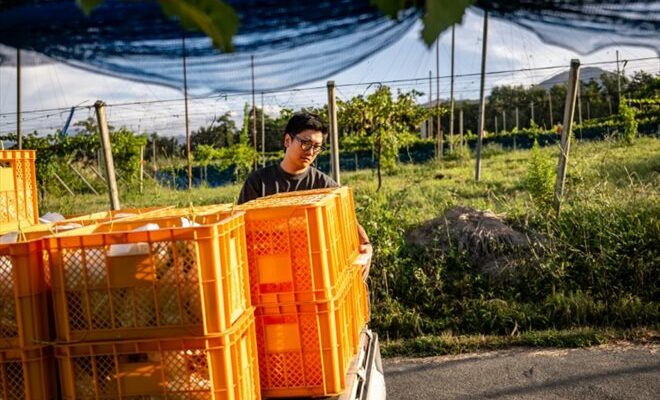Shine Muscat grapes in the vineyards of Yuki Nakamura in Tomi, central Japan, September 14, 2023 (AFP/Philip FONG)
The precious white grape variety that Yuki Nakamura grows in Japan took 33 years to develop. But it is now cultivated, without scruple, in China and South Korea, which deprive the Japanese archipelago of any royalties.
Packaged like jewels, Shine Muscat seedless table grapes are among the many new fruit varieties that Japan has patiently developed. And their price is as juicy as their beans, sometimes reaching the equivalent of 100 euros per kilo in department stores in Tokyo.
“The great thing about Shine Muscat is that each grape berry becomes big, it grows easily and it is sweet but not too sweet,” Mr. Nakamura told AFP at his farm in Ueda, near Nagano, in the heart of the Japanese Alps (center of the country).

Winemaker Yuki Nakamura shows a bunch of Shine Muscat in his vineyards in Tomi, central Japan, September 14, 2023 (AFP/Philip FONG)
This 35-year-old winemaker dreams of exporting his grapes to places where Japanese fruits are popular, such as Hong Kong or Thailand.
But there as well as on the internet, you can find reproductions of Shine Muscat from China and South Korea, sold significantly less expensive.
According to Japan, China and South Korea took Shine Muscat vine plants and successfully grafted them into their countries to produce grapes with almost similar appearance and taste.

From Shine Muscat, on Yuki Nakamura’s farm in Tomi, central Japan, September 14, 2023 (AFP/Philip FONG)
Customers “pay attention to the price,” says Sau, a fruit seller in a bustling Hong Kong market, where authentic Japanese Shine Muscat is sold for two or three times as much as its Chinese copies.
“But you can feel the difference” in quality between a Japanese Shine Muscat and its imitations, assures AFP this seller who prefers to give only his first name.
– Negligence and naivety –
The first Chinese reproductions of Shine Muscat were discovered in 2016, a decade after the registration of this new grape variety in the Japanese archipelago.
But Japan has no legal way to force China or South Korea to stop growing Shine Muscat or to pay royalties to it: because, as implausible as it seems, Tokyo has not registered this variety abroad within the deadlines set according to international rules, explains the Japanese Ministry of Agriculture to AFP.

Winemaker Yuki Nakamura harvests Shine Muscat in his vineyards in Tomi, central Japan, September 14, 2023 (AFP/Philip FONG)
Japanese producers sinned through naivety, not having imagined that other countries would come up with the idea of reproducing Shine Muscat.
“It was difficult” to make farmers aware of the need to consider fruits as “intellectual property”, adds the ministry.
Japan cannot export its grapes to mainland China due to very strict Chinese quarantine rules.
But if Beijing ever recognized Japan’s rights to Shine Muscat, “this could bring in a royalty of more than ten billion yen (62.7 million euros at current prices) per year”, Yasunori Ebihara told AFP. , director of trademark protection for plants within the Ministry of Agriculture.
The ministry also deplores the fact that new varieties of strawberries, cherries and even citrus fruits created in Japan are reproduced abroad. But here too, Tokyo neglected to sufficiently lock down intellectual property.
The Japanese revere their fruits, to the point of sometimes spending crazy sums to acquire their most beautiful specimens. In 2019, for example, a pair of Yubari melons from the island of Hokkaido (north) sold for a record price of 5 million yen (more than 40,000 euros at the time).
“Also, Japanese farmers are striving to produce better quality fruits that are ever sweeter and more delicious,” according to Mr. Ebihara.
Since 2020, Japan has banned taking seeds and young plants of varieties protected on its territory abroad, under penalty of severe penalties of up to ten years in prison.

Winemaker Yuki Nakamura unloads Shine Muscat on September 14, 2023 in his vineyards in Tomi, central Japan, September 14, 2023 (AFP/Philip FONG)
On his farm near Nagano, Yuki Nakamura is delighted that Shine Muscat grapes are now known throughout Asia.
But he “doesn’t like to see something that Japan took so long to produce” being grown and sold abroad without respect for all that work.
burs-nf-etb/ep/lth/tmt
© 2023 AFP
Did you like this article ? Share it with your friends using the buttons below.




